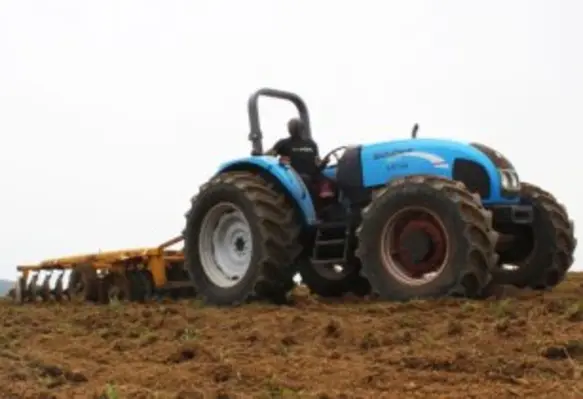Nigerian diaspora have an exciting opportunity to invest their money in farms back home via a new online financial platform created by tech start-up Farmcrowdy
Farmcrowdy is a revolutionary agri-tech platform helping to boost the £30bn agricultural sector in Nigeria. The Nigerian government is referring to agriculture as the "new oil" and companies, such as Farmcrowdy, are taking advantage of this new opportunity.
The company's ethos is to simply bring farmers and investors, so-called sponsors, together through the use of digital technology. Whereas in the past, investment into agricultural projects may have gone amiss for one reason or another, stemming either from mistrust or dishonesty between parties involved, Farmcrowdy is offering sponsors a transparent system through a mobile phone app where investors can see first-hand how their investment on a farm is progressing throughout the cycle.
It is a win-win situation all round. When the yield is sold at harvest, the sponsor receives their original investment plus 40 per cent of the profit while the farmer and Farmcrowdy receives 40 per cent and 20 per cent respectively.
The main farms currently in operation across the nine states in Nigeria are producing rice, cassava, poultry and maize. Already the company has registered 7,000 farmers since its launch in 2016 and aims to increase that number to at least 50,000 by 2020. To reach this goal, however, it wants more of the Nigerian diaspora living across the world, notably the UK, US and UAE to become a sponsor, especially those who have a passion for agriculture and want to make a socio-economic impact in their communities back home. To date, the Farmcrowdy platform has amassed more than 1,000 sponsors and total investments from Nigeria and its diaspora, now reaches in excess of £1.62mn with a growing number of sponsors in the UK.
Sola Oyawale, VP investment and corporate governance at Farmcrowdy, which has headquarters in Lagos, said he was upbeat about the level of response he had received from some potential Nigerian investors based in the UK. He said, "Nigerians understand how dominant the agricultural market is in the country, but there hasn’t been a reliable route to market, in terms of sourcing farmers and making/receiving payments. This is the challenge Farmcrowdy has set out to conquer and we’ve recorded some strong interest already, not only from sponsors in Nigeria, but also from the diaspora. Some people have a genuine passion to create an impact in their country while others have a renewed enthusiasm for agriculture and the potential for achieving strong returns on investment.
"What makes our business different to other agri-tech firms is that we are more sensitive to the concerns of the farmers and wanting to make their lives better."
Tope Omotolani, VP Operations and co-founder, and her team of specialist agents on the ground look after 3,000 farmers in Nigeria. She said, "Rural farmers contribute the largest amount of food crops that are grown in Nigeria’s economy, yet they have the least amount of resources to cultivate important food crops. In order to increase food production in Nigeria, we have set a goal to work with 50,000 farmers by the year 2020. This is no small goal by any means but we also understand that the impact these would create in the lives of the farmers, their community and in the country as a whole would be remarkable."
She said the company is working hard to equip the farmer as much as it can so that their passion for farming will continue for years to come.
"One of our incentives is that we pay the farmer to work on his farm so they don't have to wait until the end of the cycle." She continued. "We also partner with a range of companies to help the farmers. ASTC, for example, provides tractor services for our project in Jos and a team from Notore works with farmers and advises them about the type fertiliser that should be applied. We also help them to sell their crops for a better price rather than just selling crops for their family to survive."
Farmers have already seen the positive economic difference that Farmcrowdy has made to their lives.
Omotolani added, "One of our farmers told us that she was able to put some money aside to be able to go back to school, so that for me it was a testimony that would not have happened without our intervention."
Farmer Dayo Adeoye said, "Farmcrowdy has made things easy for farmers and has helped increase our production by 50 per cent. I like the flexibility, transparency and integrity. They are also open to feedback and make necessary changes. I am already recommending Farmcrowdy to people and I will continue to do so."
Meanwhile, tractor manufacturer, John Deere and Alluvial have also boosted farmers' confidence in Nigeria after agreeing to lease up to 300 tractors to at least 100,000 farmers in the Niger Delta region. The scheme will help turn subsistence farming into a commercial business by allowing farmers to rent tractors to plough and harvest the land at a competitive rate.
Dimieari Von Kemedi, the founder of Alluvial, told the Financial Times, "This deal is providing mechanisation to smallholders without them having to invest in tractor themselves. This could be an example not just for Nigeria, but for all of Africa."
With such developments taking place, it looks as if the future in agriculture in Nigeria looks very bright indeed.
For more information on Farmcrowdy visit: www.farmcrowdy.com






















